Real Healing Potions – Basic Herbal Medicine Preparations
This post may contain affiliate links. Read my full disclosure here.
We’ll walk you through the basics of making your own real healing potions (herbal remedies) and hook you up with resources to learn even more.
First up – a little background information.
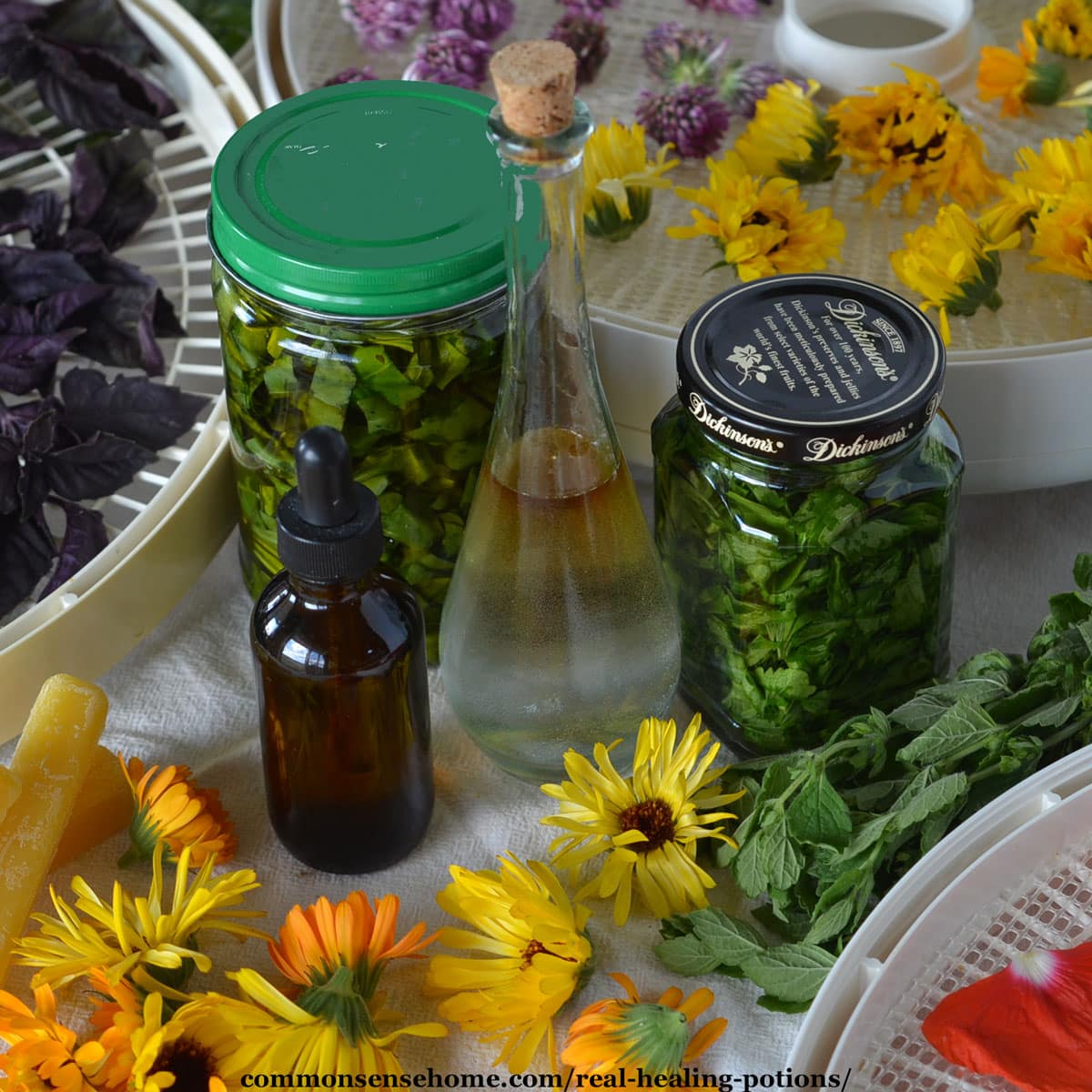
Do Real Healing Potions Exist?
Do real healing potions exist? They sure do – but they don’t immediately fix everything like they do in games. That said, there are TONS of options – possibly right in your backyard – for treating everything from upset stomachs to congestion, and even chronic illnesses.
Note: This next section was written when my sons were just little boys, growing up on the homestead.
My boys are RPG (role playing game) enthusiasts. The younger generally enjoys giving a good thumping to something that sincerely deserves it or growing things (he is a dirt lover on and off the computer). The elder enjoys designing scenarios, cities, potions – he’s always creating something.
I left one of my favorite herb books, the Holistic Herbal, out on the kitchen table. I spend a lot of time researching plant properties, so I like to keep it handy.
Number one son is a compulsive reader – books, magazines, packaging, over my shoulder while I’m typing – so of course he noticed “the book”.
“Mom”, he inquires, “are these recipes for REAL healing potions?”
“Yep – and most of what you need to make them is growing out in the back yard.”
He set off immediately to gather odds and ends to brew his first concoction. I warn him not to experiment without checking with me first, as medicinal herbs are medicine. More is not necessarily better and they can have side effects.
He is a pretty responsible kid, and has a near-photographic memory, so I’m glad to have him on board with my latest project. It’s a nice tie-in to our botany and Latin studies as well.
He made an herbal tea, which is also known as an herbal infusion. Since then, we’ve experimented with all sorts of infusions, salves and ferments.
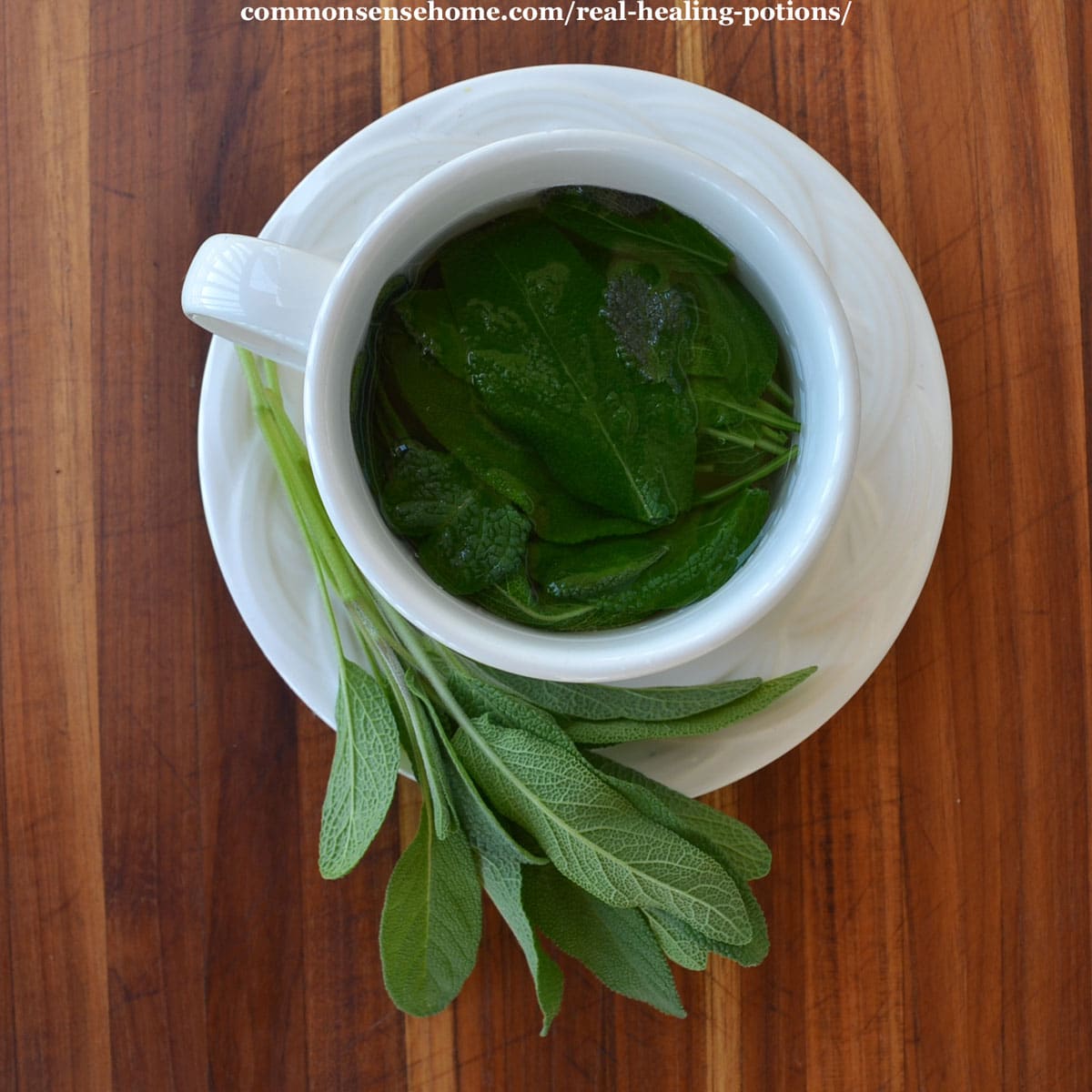
Types of Herbal Remedies (Basic Herbal Medicine Preparations )
Herbal medicine preparation are either internal, or external. Internal remedies are those you eat or drink. (This would be the type of thing most people would think of as a healing potion.)
External remedies get applied to the skin. This includes preparations like salves and poultices.
Water Based Preparations
There are two types of water based herbal remedies – infusions and decoctions. If you’ve made herbal tea, you’ve made a simple infusion. Infusions work best for flowers and leaves. For woody parts and roots, use a decoction.
To make an infusion, add one teaspoon of dried herbs to your cup. (Use 2-3 teaspoons of fresh herbs.) Add one cup of boiling water to the herbs. Cover and steep for 10-15 minutes.
Would you like to save this?
Strain out the herbs and sweeten with a little honey, if desired.
To make a decoction, start with a glass, ceramic, or other non-reactive pot. (Do not use aluminum.)
Add one teaspoon of dried herbs or a tablespoon of fresh herbs, cut into small pieces. Cover with one cup of water. Place the lid on and bring to a boil, and then boil for 10-15 minutes. Strain and drink the decoction.
See “How to Infuse Herbs in Oil, Water, Vinegar, Alcohol or Honey” for more information on different types of infusions. Check out “Harvesting and Using Dandelion Roots” for dandelion root decoction recipes.
Alcohol Based Preparations
Some plant constituents infuse better into alcohol than water. The alcohol also acts as a preservative.
To make a basic alcoholic tincture, place 4 ounces of dried herbs (or 8 ounces of fresh herbs) into a glass jar with lid. Cover the herbs with 1 pint of vodka (60-80 proof/30-40% alcohol) and close the container.
Shake the jar twice a day and place it in a warm location. After two to four weeks, strain out the herbs through a thick cheesecloth or flour sack towel. Store the liquid in a dark container and store in a cool location, out of direct sunlight.
You can also infuse herbs into wine and other types of spirits.
Other Herbal Preparations
If you avoid alcohol, you can make tinctures with vinegar or glycerin. They don’t work quite as well as alcohol, but make an acceptable substitute.
Herbal syrups, like elderberry syrup and pinecone “jam”, are throat soothing and immune system boosting. There are also oxymels, capsules, pills, lozenges, and more.
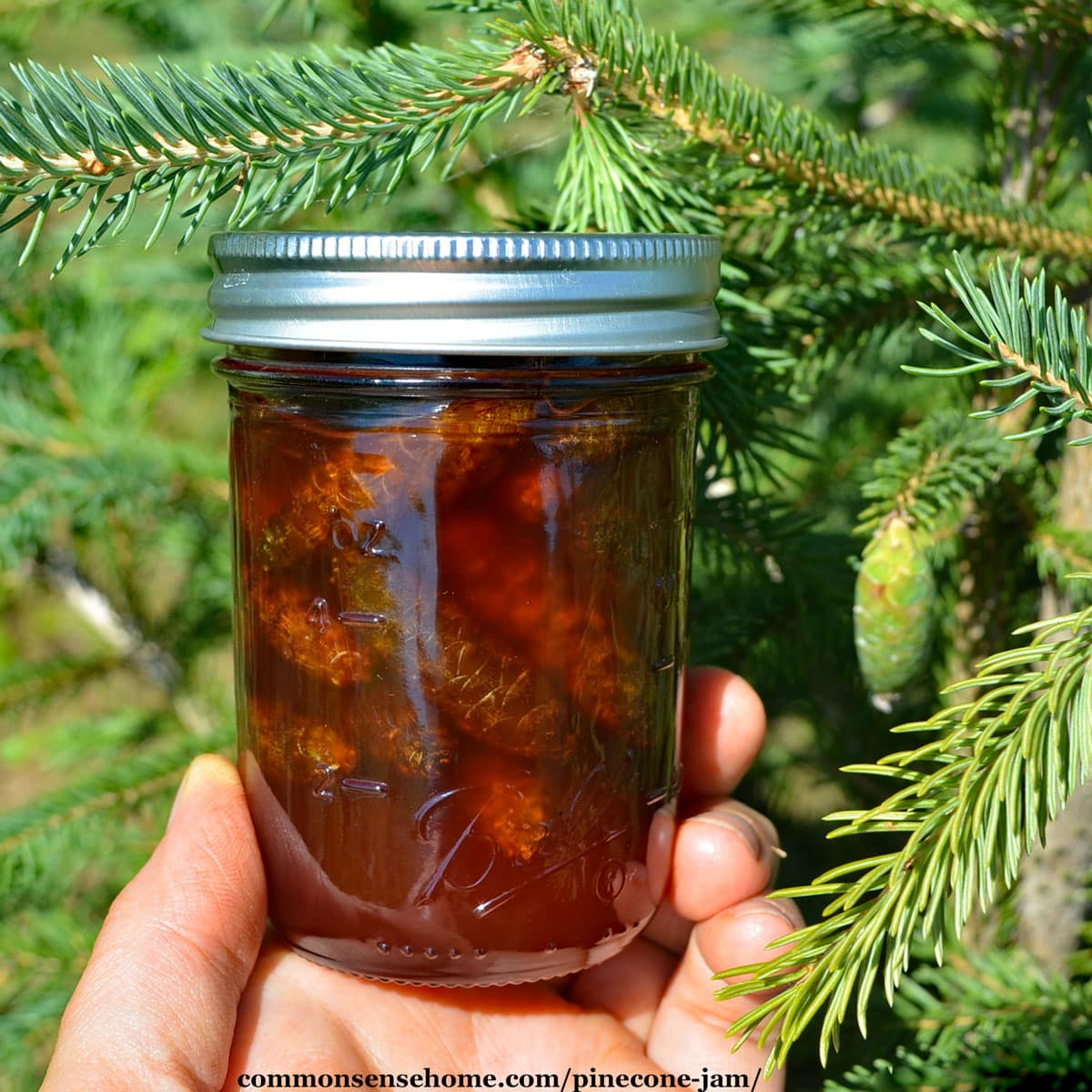
Learn More About Herbal Healing
If you want to learn more about herbal remedies, there are a lot of great resources out there – and unfortunately, some not so great ones.
You can check out some of my favorite books (and a board game) in the article “Wildcrafting Resources“. We also have dozens of posts on herbalism and wildcrafting.
For more in depth training, check out the Herbal Academy. They have courses from beginners to advanced, including mini courses, like Making Herbal Preparations. It’s a great place to learn and explore.
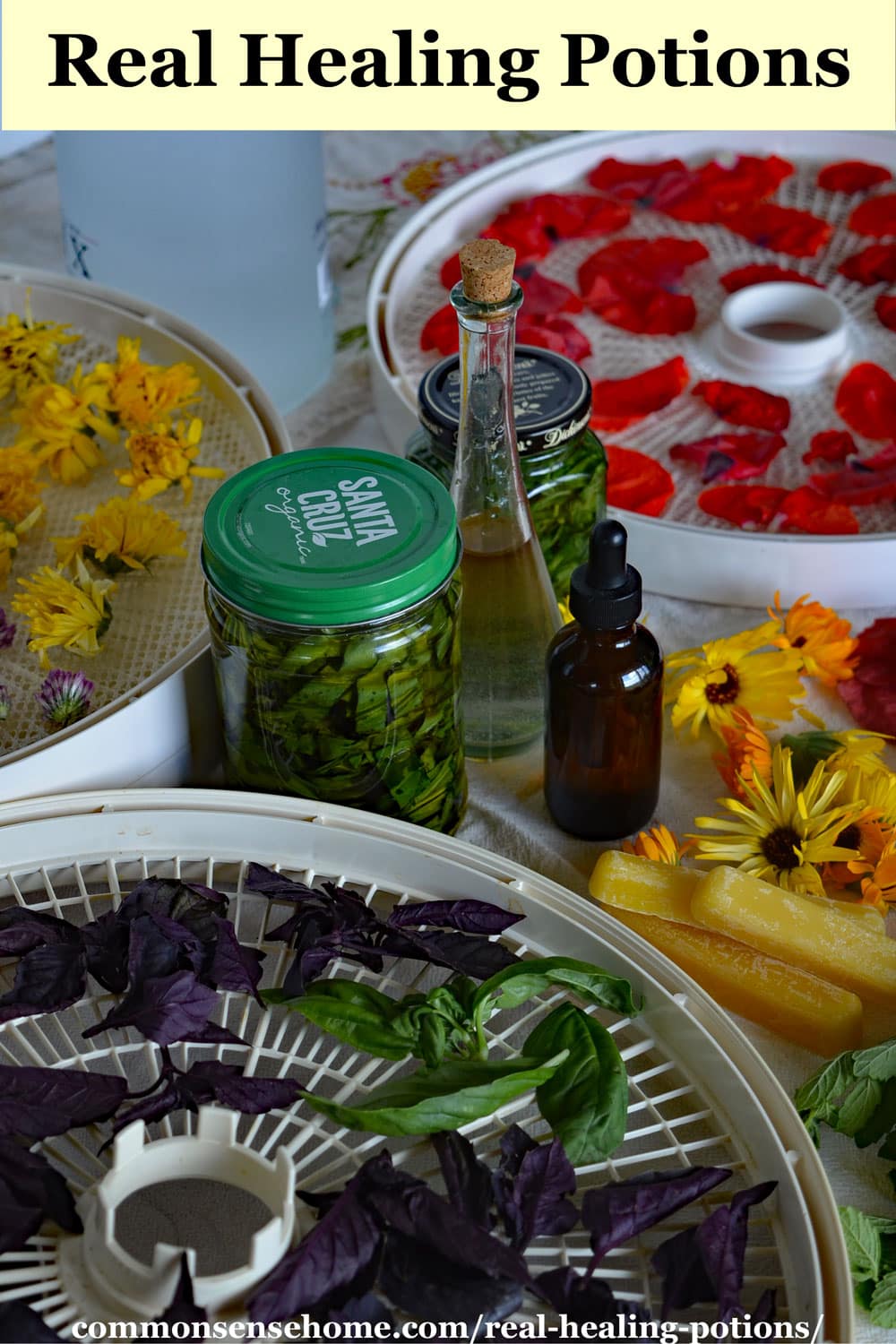
Originally posted in 2009, last updated in 2022.

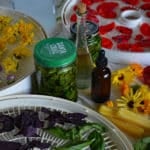
Laurie, you might want to update this real soon. i.e. Guercetin, oregano and basil, etc etc are known to be good antibiotics for bacteria, virus(there are no real medical antibiotics for viruses) and MOLD!
And, YES, to the bites that can cause some really concerning immune system surprises (unpleasant ones). Many move to the country now and have no clue what they are getting into. I have a friend who had a tick bite and did not go to get it removed correctly and the circle formed. She has had long term consequences. Another one had a copperhead bite and did not go for treatment. He has to stay on blood thinner for the rest of his life. If he doesn’t have it for one day or less, the blood clots start with a rage. and on and on.
My dog almost died from chicken poop while she was rooting around in the ground. And, from throwing sticks for her – her esophagus got a tear in it (very dangerous) Children also can get these issues and frequently get the chicken infection if mom and/or dad don’t watch them and wash them up when back inside or at a spigot outside.
And, that is just the organic folks. Those who fool with chemicals get slowly killing problems and don’t know where it came from. The Mennonites near me are now using Roundup _ what happened to them?
Hi Martha.
I have to be careful about how I phrase things on the site, keeping things general, and I can’t cover everything in one article. This site is not intended to replace the care of a trained healthcare provider, and people should seek assistance for serious conditions. People should also follow basic safety and hygiene protocols.
We do have a post on herbs that have known antibiotic properties. See “Herbal Antibiotics“.
There are also herbs with anti-viral properties, anti-fungal herbs, anti-parasite herbs (anthelmintics), and much more.
People have been told that all the chemicals are safe and effective, and they can certainly make farming easier – but at a cost. Soil health and nutrient levels of crops are declining, and it’s a downward spiral.
Thanks for the awesome advice my husband liked the bread very much!!! Thanks Again!!!
??
-Irene
You’re welcome.
Can you please make some and send it to me. if yes I’ll send you my address
I don’t sell herbs, but we do have lots of information on the site to help you make up your own remedies on the Herbs and Wildcrafting page.
I would deeply appreciate knowing when you publish the updates on your mother’s story. Thank you so much.
Unfortunately, my mom passed away a few months after I wrote this post, skin mystery unsolved. You can read more about her situation and see some photos here – https://commonsensehome.com/toxic-skin/
I wish i had access to the knowledge you have. I would love to learn more about potions and sauves and magical brews. I do so much magic with plants. The humans around here have not a clue. I work magical wonders. That appear to defy reality. I have helped many with my simple ointments, But can never seem to find any true to blue books on herbs and botanical brews. All are from video games and fabricated fakes.
Kyle,
By any chance, do you live in an area where recreational marijuana is legal? If so, you may want to ease up a little. #staysafeoutthere
its only legal with a green card and would have to register if you wanted to grow it. I grow natural wild herbs like lavander and clovers and arnica. Nothing drug level or illiegal.
I would be interested in knowing what your mother’s problem was, and what if anything you discovered helped. If you are free to share.
Personally, I made a salve with Plantain, that seemed to help a lot with spider bites. I think my granddaughter attracts spiders!
It’s been awhile since I made it, but if I remember right, I used an infusion made with olive oil, added coconut oil and beeswax. I followed a recipe for salve that I found on an essential oil site
Looks like I should really update this post…
I found out later that my mom had a pseudolymphoma. Unfortunately, she dealt with it until she passed away. You can read more about her story here – https://commonsensehome.com/toxic-skin/
There are links at the bottom of the post to make the plantain infused oil and salve from the infused oil.
Thank you for the great articles and mostly for referencing where your information comes from. I think one of my New Years resolutions has ended up being “not” to believe everything just because it is on the internet, lol! Not that everyone doesn’t have the best of intentions…
You have made my morning coffee much more enjoyable today!
My kids work right along side me and use what we harvest, so I try to research thoroughly and experiment carefully.
Nicole – link is fixed. Thanks for letting me know. I moved my blog over from blogger at the beginning of the year, and occasionally find a link that doesn’t redirect properly.
What do you use the red clover for? link didn’t work. thanks:)
Amy – if you can't find plantain growing wild in your area, Mountain Rose Herbs sells plantain seeds that you can grow in your home garden. I just added a link to their site on the sidebar.
I am going to start growing herb this year. Great information!
Not sure what zone you're in, but it does grow all over the US (this link has a map: http://www.woodrow.org/teachers/bi/2000/Ethnobotany/common_plantain.html).
Mine isn't growing here yet, but then again nothing much is growing here just yet. There was still ice on the puddles this morning – brrr! I can't believe that this time last year I had greens planted in the garden for almost a month by this time. This year those beds are sodden and frozen.
Those trays look beautiful indeed! I've search for Plantain in my back mountain side, but to no avail. Perhaps it will come up a little later in the season? I need to take a hike and find some of this stuff!
Laura – check back w/ the original sites I quoted the information from – they have a lots more info on a wide variety of plants.
Lo – I tried the plantain tea when my youngest had a cold. I couldn't get him to drink much, but I finished what he didn't and it was quite tasty. My tea ball is finally getting a work out this year. I wonder if I could use it to brew kombucha?
Will be very interested in following your adventures in this area. I find myself wishing I had more plantain (my neighbors are cringing, I'm sure) so that I could put some of it up 🙂
LOVE that serious hands on training for your kids. Couldn't get a better education than that if you tried!
I hope it's OK, but I printing out this information! It's great that the kiddos are learning the natural way to be healthy!
Lisa – we don't spray, so it's definitely a good idea to make friends with the "weeds". Our garden may look a bit like a mad jumble, but it's organized chaos. (That's my story and I'm sticking to it.) Also, if you learn to eat/use a wider spectrum of foodstuffs, something is always bound to produce, no matter what the weather.
Oh my goodness! We would get along sooooo well. Loving those wonderful wilds that grow in our yard; encouraging them to grow instead of "pulling a weed." I haven't used the dehydrator on my herbs yet, it's a good idea, don't know why I haven't yet. I can't wait to see more of your earthly love!
Lisa 😉
Would love of u could send me some of what u have enough to share
Oh my goodness, this is homeschooling at its finest!! I enjoy reading about your gardening journey, I dream of having my own one day. 🙂
I think it was helpful but do you think that there is any concoctions I should avoid?
Get a good reference book (or several – my favorites are listed here – https://commonsensehome.com/wildcrafting-books/) or take a course on using wild plants, like this one from the Herbal Academy – https://commonsensehome.com/botany-wildcrafting-course/
There are thousands of plants out there, and many can make you sick or seriously ill.